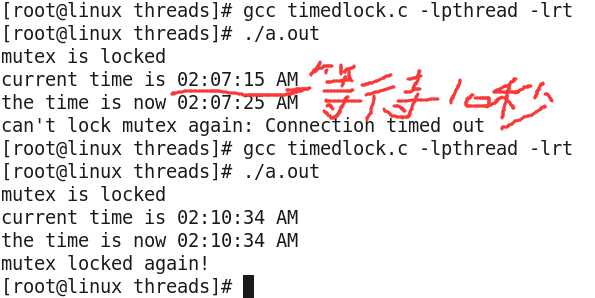标签:
函数pthread_mutex_timedlock 当线程试图获取一个已加锁的互斥变量时,pthread_mutex_timedlock互斥量原语允许绑定线程 阻塞的时间。pthread_mutex_timedlock函数与pthread_mutex_lock是基本等价的,但是在达到超时 时间值时,pthread_mutex_timedlock不会对互斥量进行加锁,而是返回错误码ETIMEDOUT。 #include<pthread.h> #include<time.h> int pthread_mutex_timedlock(pthread_mutex_t *restrict mutex,const struct timespec *restrict tsptr); 超时指定愿意等待的绝对时间(与相对时间对比而言,指定在时间x之前可以阻塞等待,而不是说愿 意阻塞Y秒)。这个超时时间是用timespec结构来表示的,它用秒和纳秒来描述时间。
#include"apue.h" #include <pthread.h> #include<time.h> int main(void) { int err; struct timespec tout; struct tm *tmp; char buf[64]; pthread_mutex_t lock = PTHREAD_MUTEX_INITIALIZER; pthread_mutex_lock(&lock); printf("mutex is locked\n"); clock_gettime(CLOCK_REALTIME, &tout); tmp = localtime(&tout.tv_sec); strftime(buf, sizeof(buf), "%r", tmp); printf("current time is %s\n", buf); pthread_mutex_unlock(&lock);//这个是我自己加的,为了测试这个程序 tout.tv_sec += 10; /* 10 seconds from now */ /* caution: this could lead to deadlock */ err = pthread_mutex_timedlock(&lock, &tout); clock_gettime(CLOCK_REALTIME, &tout); tmp = localtime(&tout.tv_sec); strftime(buf, sizeof(buf), "%r", tmp); printf("the time is now %s\n", buf); if (err == 0) printf("mutex locked again!\n"); else printf("can‘t lock mutex again: %s\n", strerror(err)); exit(0); }

标签:
原文地址:http://www.cnblogs.com/leijiangtao/p/4595886.html